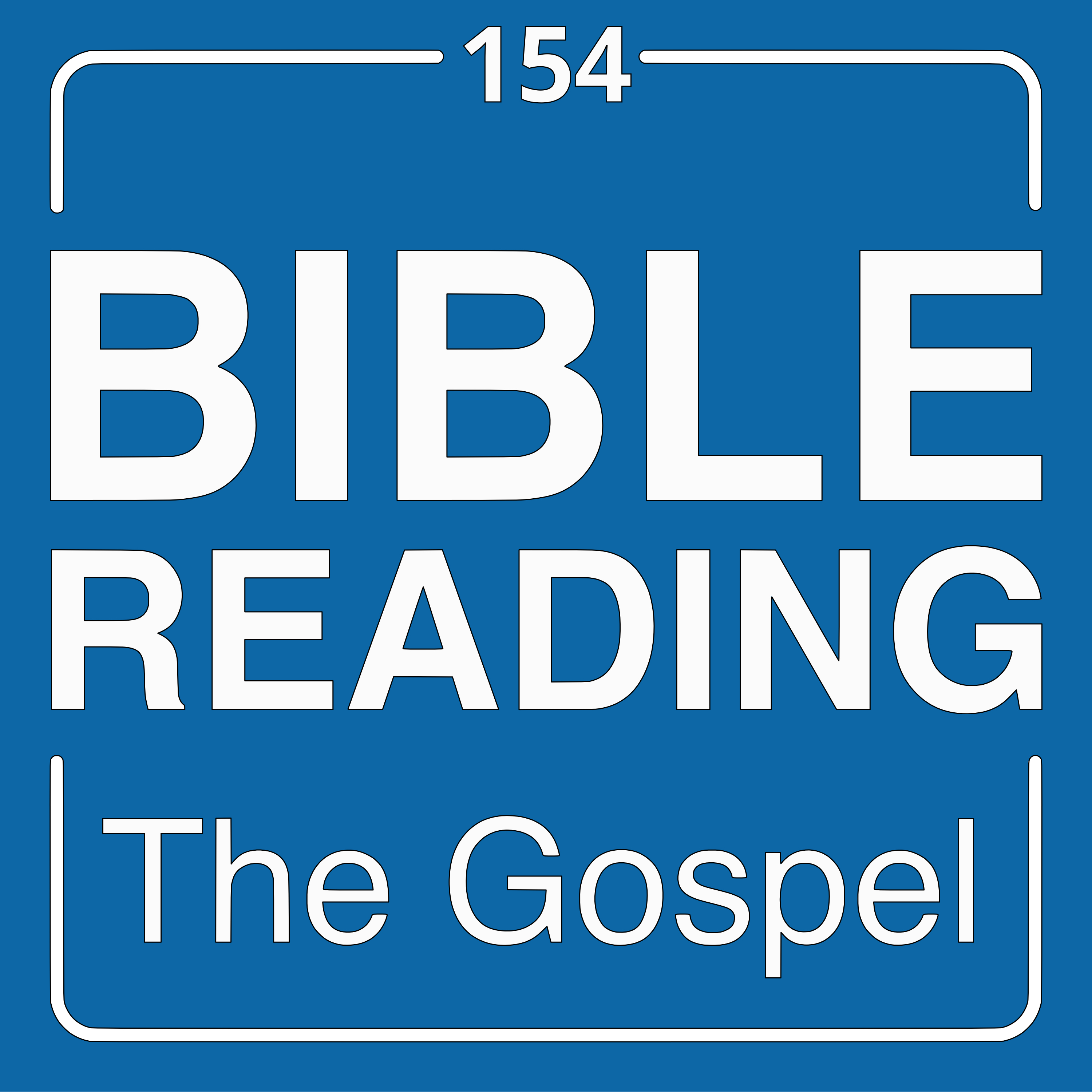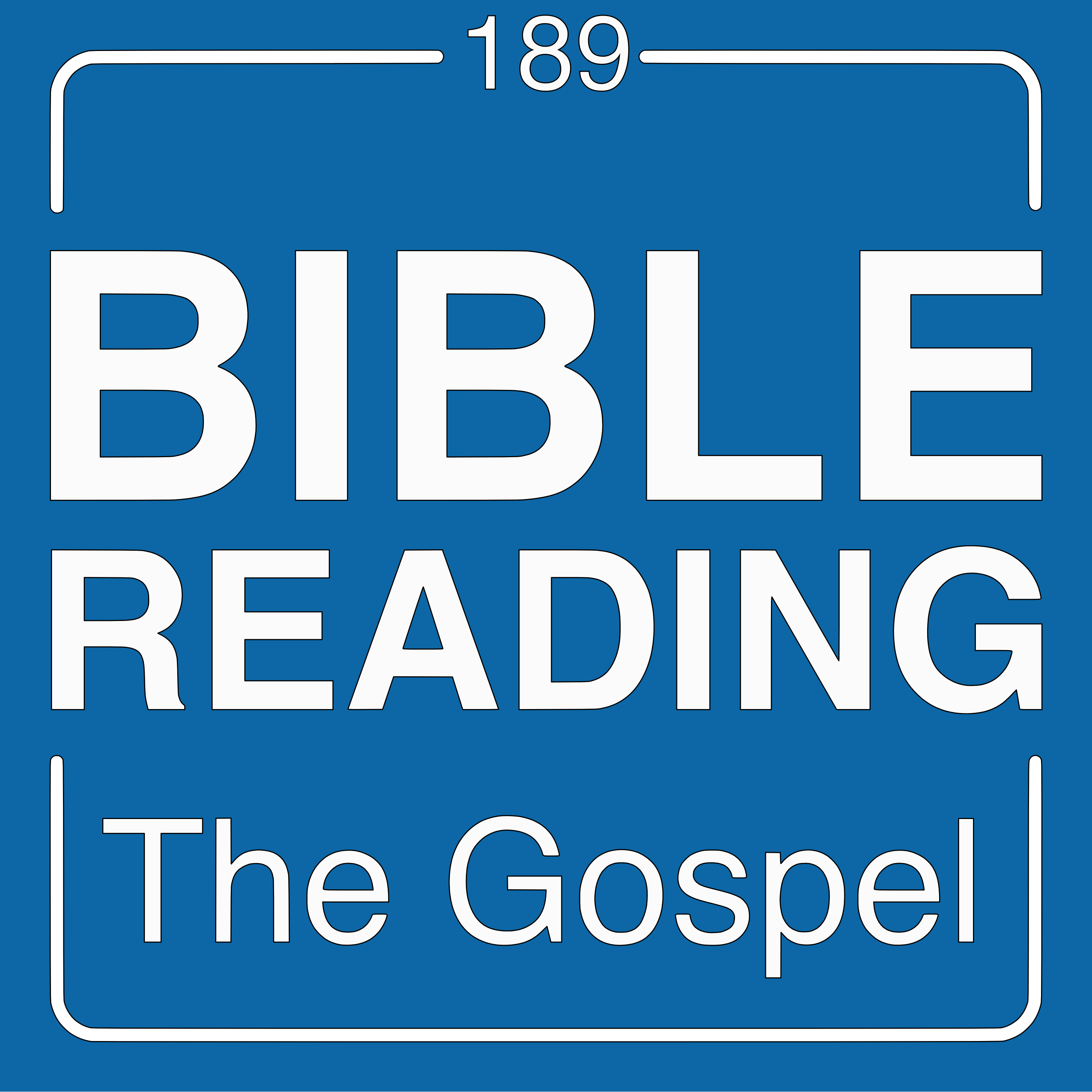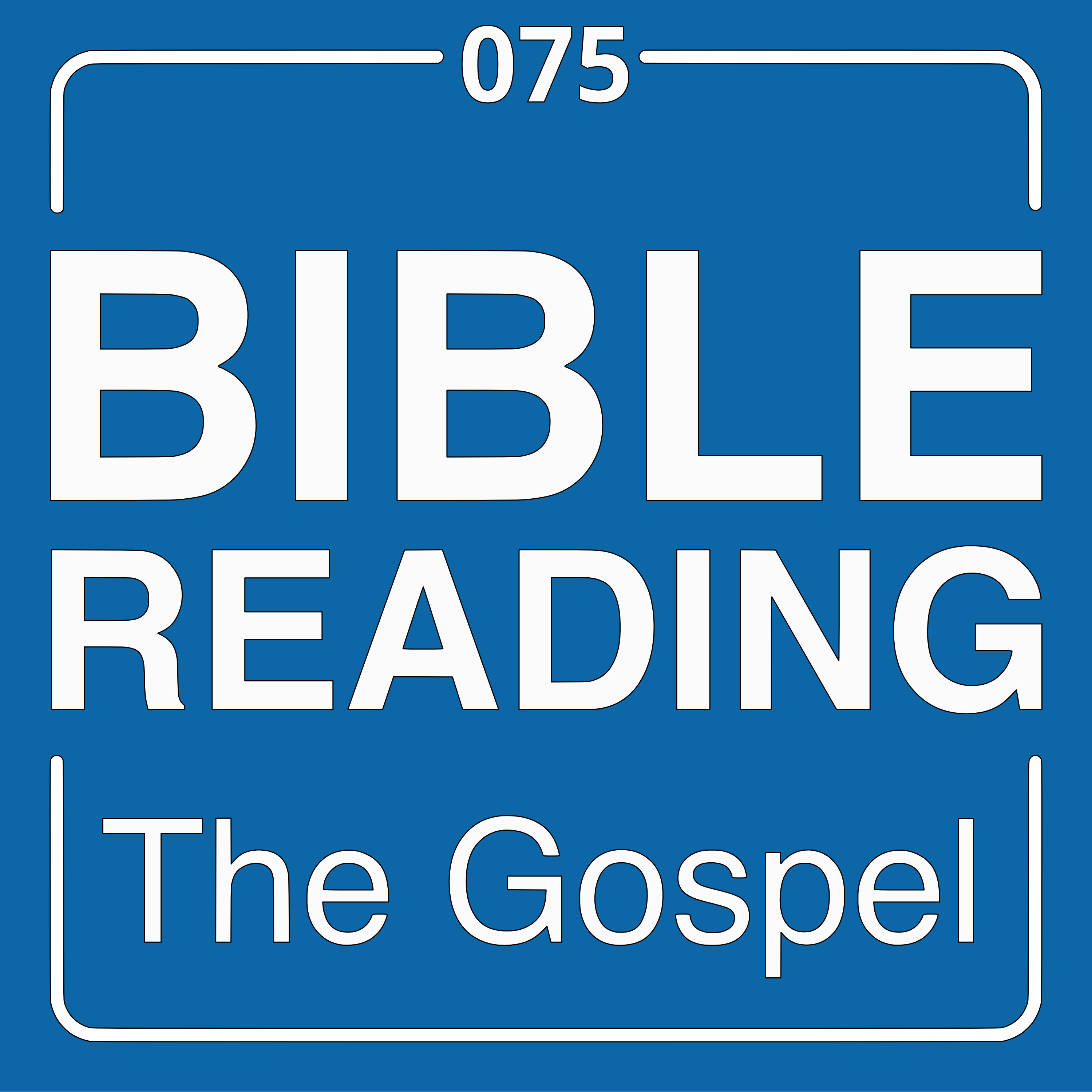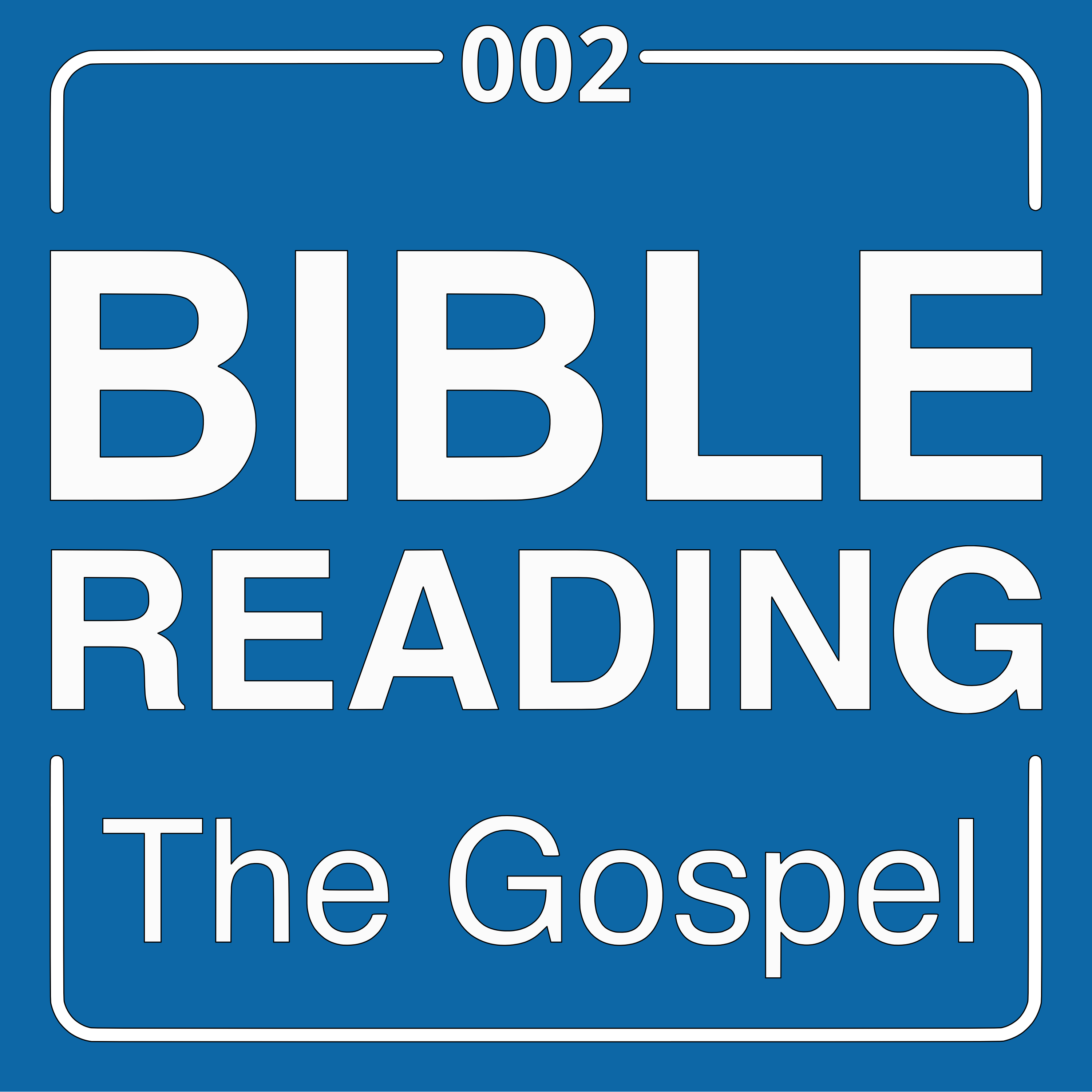Episode Transcript
[00:00:24] Speaker A: Hello. I'm Josh.
[00:00:25] Speaker B: And I'm Gabriel.
[00:00:26] Speaker A: And today, on reading the gospel. We are studying the event, the divine origin of Christ. This is found in the book of Matthew, chapter 22, verses 41 through 46. In mark, chapter twelve, verses 35 through 37. And in Luke, chapter 20, verses 41 through 44.
Follow along with us as we read in Matthew, chapter 22, 41.
[00:00:54] Speaker B: Now, while the Pharisees were gathered together. Jesus asked them a question, saying.
What do you think about the Christ? Whose son is he? They said to him, the son of David. He said to them, how is it then that David, in the spirit, calls him Lord?
[00:01:15] Speaker A: Saying, the Lord said to my lord, sit at my right hand until I put your enemies under your feet.
If then David calls him Lord, how is he his son? And no one was able to answer him a word. Nor from that day did anyone dare to ask him any more questions.
So this is a very short event, but it's a very powerful event. The Pharisees knew about the prophecies of a messiah. They knew the promise, you know, from the garden of Eden. When Adam and Eve sinned, there was a promise that there would be one who would come. Then through David. There was this promise of the Messiah coming. And they expected the Messiah to be a descendant. Rightly so. A descendant of David.
And Josephus, as we've talked about before, talks about many people at this time. He lists over a dozen who thought that they were the messiah. And these are all people who have come to restore the nation of Israel. To fight the Romans. To bring Israel back from oppression and bondage. And that it can be its own nation.
What I think all of them missed was that divinity question. They didn't see the Messiah necessarily as divine. They saw the Messiah as a political or military savior for the nation.
And so now here, after the scribes, the Pharisees and the Sadducees. Have all had conversations with Jesus. Jesus is turning the tables and asking them a question. The crowds are around. They're listening as well.
And so Jesus asked them, who do they think Christ is? And they answer correctly, the son of David. Right.
How does it tie in that David calls him lord?
What does that mean?
Is there significance there that David is calling the Messiah lord?
[00:03:23] Speaker B: You then call your son my lord. That was very inappropriate in the oriental language of those times.
It is only someone who is above you, who is superior.
That you call my lord.
[00:03:38] Speaker A: And it's not that he was talking to Solomon. And Solomon was on the throne at the time.
You don't do that.
And we can know by the reaction of the Pharisees. That this was not a common statement. That this was not an easy answer.
[00:03:58] Speaker B: So it seems that they got the answer. Because this is why they were silenced. Finally, at the end of the previous two or three episodes. Jesus was able to end the conversation. That group stopped asking questions. But this time, the whole debate, the whole day, was ended. All of them were silenced. Because the Pharisees really understood.
That the Messiah is called by David, my lord.
They realized that the origin of the Messiah is of a different order. It is above human.
So those words tied very well into what Jesus claimed about himself. Saying that God is his father, that he came from heaven, that he is the living bread. That he came to seek and save the lost.
All of these are coming together through this statement about his divine origin. And that is a very strong argument. Especially for those who are studying the Bible. Doing a very deep biblical analysis.
[00:05:08] Speaker A: And this debate ends because it says they dared not ask him any more questions. Not just that day. We don't find them asking him questions after that. They don't come back. So Christ here is claiming divinity. And I know that there are religious groups that believe the Bible. That say, well, Christ was just born.
He was a prophet or a good person. He's not God.
[00:05:37] Speaker B: He's created by God.
[00:05:39] Speaker A: He's created by God.
But this shows the divinity that he existed before that. David saw him as his lord.
[00:05:51] Speaker B: Yeah. So this idea, Lord in the Old Testament. Is transferred upon Jesus Christ, who is my lord. And that expression is tied into two titles together. My lord and my savior. That means the Lord means a person to whom I report, someone I follow. It is someone that will take over my life. And I will be a devotee or a follower of this Lord. Also, I like to emphasize that this is the context of the last days of Jesus Christ.
A few days before his crucifixion.
And Jesus Christ is not making just a theoretical, intellectual point.
Because he doesn't have too much time to waste for that. Those arguments of his divinity have been established before.
I see this conversation more like a last appeal, a last invitation.
Get back to your senses. Look what the Bible says about the Messiah.
Maybe you're on the wrong path because you want to kill me. It is a call to wake up. And I like how Jesus Christ is quoting from the book of psalms.
Sit at my right hand until I put your enemies under your feet.
For the Pharisees, they thought that Messiah's enemies are the Romans. But in this context, those who wanted to kill Jesus Christ. Were not the Romans or the Pharisees and the priests who are present there in the multitude.
And these enemies are included in God's pre knowledge. Because God inspired to say these words.
And Jesus was talking about them.
He's unveiling their plans to kill Jesus Christ. And at the same time, he gave them an extra argument of his divinity. Inviting them to wake up, to come back closer to him, maybe to stop those evil plans. I really see God's love into this.
God loving them, going the extra mile. The same way Jesus Christ taught us to go the extra mile. He's modeling that, exemplifying it, I think.
[00:08:27] Speaker A: Of one of the very first stories in the Bible of Cain and Abel. You know, Cain had offered this sacrifice to God. The fruits.
That was not what God asked.
And he gets angry that God accepts Abel's sacrifice, but he doesn't accept his own. And as he's walking through this field, getting more and more angry, bent on destruction. God is not there saying, you're done, you're out. He's not sending lightning bolts down to strike him, to. To smite him or anything. But he's having this conversation.
[00:09:04] Speaker B: Yeah.
[00:09:05] Speaker A: Sin's at the door. You know, don't go in. Don't go further.
[00:09:08] Speaker B: It's crouching there. It's just next to you.
[00:09:11] Speaker A: Yeah. It's waiting to pounce. And I think this is the same for these pharisees. That sin is at the door. It's waiting to pounce on you. That even yet you have not crossed that red line. You can still ask for forgiveness. And to be honest, even after Jesus died on the cross, there's still salvation. Because we find the religious leaders coming to Jesus afterwards. The roman soldiers who stand there at the cross and see Jesus and confess. Surely this is the son of God.
[00:09:40] Speaker B: Because Jesus prayed for him. And for all of them, Father, forgive them. Because they didn't know what they are doing. Then take into account, then write them as written in stone. Forever what they are doing now.
[00:09:54] Speaker A: Yeah. And so we have this happening here.
The crowds who are around, they're seeing this debate as well. And they see how the Pharisees respond.
That Jesus has brought another point out of scripture that the pharisees cannot answer. And they leave after this. And then Jesus gets into the seven woes. To the scribes and pharisees. Our next event that we'll cover.
[00:10:23] Speaker B: Jesus Christ debating them.
Having those conversations. In which religious group by religious group. Try to entangle Jesus Christ in one of his words. To be able to publicly accuse and kill Jesus.
And this event has.
It's a turning point.
It is initiated by Jesus Christ. And it comes from that love of God that wants to not just to reveal our sins, but to give us a new opportunity to turn around.
This is how I see our God. A God of a second chance and maybe third chance or the fourth chance or the 7th chance, right? Or even more 7th times seven, as Jesus Christ taught Peter.
[00:11:12] Speaker A: Yeah.
So what is this passage telling us about God and what are we going to do about it?
For me, I see here a God who loves us so much that he's laid out his plans ahead of time and he's willing to come down and to be abused by us and to love even those who we're abusing now. While he's on this earth, while he's doing these things, he's still creating a way for them to be saved.
It's easy to think of God loving us, removed outside in a perfect world. But when God loving us, when he's the victim of our actions, that takes the love to another level for me, that he loves us while we are sending him to the cross and crucifying him and rejecting him, that he's still making way for us to come.
[00:12:07] Speaker B: I like to connect this story with a previous episode when Jesus told the you get lost because you know not the scriptures.
Of course, they are the most educated in the scripture.
Those times. They knew the letter of the scripture, they knew the story, but maybe they even knew the meaning of some events. But they didn't know personally the person behind those words. And as a result, when they are reading the scripture, they haven't heard the voice of God speaking to them. And because they haven't heard the voice of God, they didn't try to apply something and they could not experience the power of God.
The same process can be applied now to the Pharisees in this story.
They knew those words from the book of Psalm, but they didn't know the God who inspired those words. And the Lord who is David's Lord, that is, the Messiah, who was visibly, personally present among them. And as a result, they could not experience his power.
[00:13:27] Speaker A: So we need to get to know the Lord exactly.
[00:13:30] Speaker B: We need to read the scripture with that purpose, to know him and to embrace him, to bring him into our lives and to experience his power.
[00:13:41] Speaker A: Let's pray.
Father God, we want more than a head knowledge. We want to know you. We want to love you. We want to experience a relationship with you, a life changing relationship.
Father, I pray that if there are parts of the scriptures that we're not following or we're getting wrong. That you will make it clear as we dwell with you, as we read and study the Bible personally each and every day, that we will be open to admit that we're wrong. That we will follow wherever you lead, and that we will love others as you have loved us. In Jesus name, amen.
[00:14:21] Speaker B: Amen.



